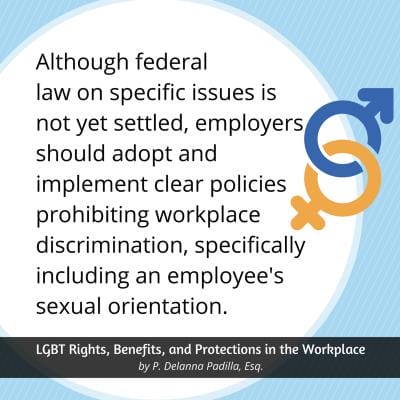
Categories

Wright Lindsey Jennings’ Labor & Employment Team is featured on Sterling Educational Services’ Legal Education Blog, discussing how recent changes in the law impact the rights of LGBT individuals in the workplace.
People’s attitudes toward same-sex relationships has changed dramatically in recent years. In 2015, the law caught up with those changes. The Supreme Court ruled in Obergefell v. Hodges that state laws could not ban same-sex marriages and that everyone has a constitutional right to marry. By extension, this ruling impacts employee benefits, such as FMLA, retirement plans, and medical insurance.
Employers need to consider revising their employee benefit plan documents to comply with current law.
EEOC’s Stance on Sexual Orientation Discrimination
Federal law on anti-discrimination is still unsettled concerning sexual orientation. However, of particular importance to employers, the EEOC now takes the position that Title VII’s prohibition against gender discrimination includes discrimination on the basis of sexual orientation and gender identity.
In fact, in July 2015, the EEOC identified such discrimination as an enforcement priority for the agency. Going forward, the EEOC will investigate charges alleging workplace discrimination that is based on sexual orientation or transgender status (i.e., the employee identifies with a different gender than the gender assigned to them at birth). EEOC data shows that the number of charges alleging sexual orientation and gender identity discrimination has increased substantially in the last couple of years.
In April of 2015, the EEOC ruled that a transgender employee cannot be denied access to common restrooms used by employees of the same gender identity. In other words, a person who identifies as a woman must be permitted to use women’s restrooms. The same reasoning likely applies to locker rooms and similar facilities.
OSHA’s guidance provides that while a single-occupancy gender-neutral facility can be offered to transgender employees (and may be a welcome alternative for safety or privacy reasons), transgender employees cannot be required to use the alternative facility in lieu of common, gender-specific restrooms.
Second Circuit Upholds Dismissal
It should be noted that federal courts have not followed the EEOC’s lead on this position. On December 16, 2015, the Second Circuit upheld the dismissal of Title VII claims based on perceived sexual orientation discrimination. The Second Circuit made no mention of the EEOC’s prior ruling. The Second Circuit ruled that the plaintiff could not plausibly please a “good faith reasonable belief” that he had complained about conduct prohibited by the statute and so allowed the dismissal of plaintiff’s Title VII retaliation claim.
Retirement Plan Guidance
However, the IRS has issued guidance, Notice 2015-86, which confirmed that qualified retirement plans may change plan terms or operations as a result of Obergefell v. Hodges. Additionally, the Notice discusses how the ruling could affect the operations of health and welfare plans and provides that cafeteria plans may permit mid-year election changes to add a same-sex spouse.
Employers, as plan sponsors, should review plan terms and operations to determine what changes would be required to be in compliance.
Workplace Policies
Rulings that change or clarify laws tend to raise as many questions as they answer. So how do employers know how to proceed?
Although federal law on specific issues is not yet settled, employers should adopt and implement clear policies prohibiting workplace discrimination, specifically including an employee’s sexual orientation. Employers should also modify their employee benefit plans to comply with the current state of the law.






































































